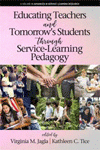
Educating Teachers and Tomorrow’s Students through Service-Learning Pedagogy
Edited by:
Virginia M. Jagla, National Louis University
Kathleen C. Tice, University of Texas at Arlington
A volume in the series: Advances in Service-Learning Research. Editor(s): Alan S. Tinkler, Missouri State University. Todd A. Price, National Louis University.
Published 2019
Service-learning is a powerful method of teaching and learning that has been used effectively for more than two decades. This volume contributes further to the Advances in Service-Learning Research series that focuses upon service-learning in teacher education. Research and theory indicate that knowledge of service-learning pedagogy and how to implement it in teacher candidates’ future classrooms can enhance field experiences of teacher education and the civic mission of schools. However, research also reminds us that that the practice of service-learning is nuanced and complex. No two service-learning experiences are alike, yet universal characteristics across service-learning experiences define its essence and distinction. It is through research that digs deep into these nuanced issues that we can learn more about the different characteristics of the experience that define service-learning and guide implementation.
The preface provides an interview with Andy Furco, an early advocate of service-learning and noted leader who has fostered service- learning in K-12 and higher education throughout the United States and across the globe. Andy Furco’s commentary offers an historical overview of the field as well as how the field can advance, providing insights for those new to the field as well as those who have engaged in service-learning. The preface and thirteen chapters together provide empirical and conceptual support for including service-learning. Concurrently, this scholarship provides guidance for implementing service-learning in teacher preparation and in K-12 education. Interrelated themes include self efficacy, connections with communities, diversity, and program development in teacher education.
CONTENTS
Preface: A Visit With... Andy Furco. Acknowledgments. PART I: CONCEPTUAL PERSPECTIVES. Imagining a Better World: Service-Learning as Benefit to Teacher Education, Virginia M. Jagla, Antonina Lukenchuk, and Todd A. Price. Can We Develop a Professional Ethic of Service in Education? Reese H. Todd. PART II: EFFECTIVE TEACHER PREPARATION PROGRAM DESIGN AND DEVELOPMENT. Developing Service-Learners Into Service-Leaders, Susan A. Colby, Ann-Marie Clark, and James Allen Bryant, Jr. Service-Learning With Young Students: Validating the Introduction of Service-Learning in Pre-Service Teacher Education, Nancy McBride Arrington. Changes in Students’ Social Justice and Racial Attitudes in an Undergraduate Child Psychology Service-Learning Course, L. Mickey Fenzel and Rebecca J. Dean. PART III: PROMOTING SELF EFFICACY IN PRESERVICE TEACHERS. Towards Understanding When Service-Learning Fosters Efficacy Beliefs of Preservice Teachers, Kathleen C. Tice and Larry P. Nelson. The Impact of Service-Learning on Teacher Candidates’ Self-Efficacy in Teaching STEM Content to Diverse Learners, Eunmi Yang, Karen L. Anderson, and Briana Burke. PART IV: THE IMPORTANCE OF COMMUNITY CONNECTIONS. Teacher Education Redefined: Contextual Cognizance and the Potential for Community Impact, Eva Zygmunt-Fillwalk, Patricia Clark, Jon Clausen, and Wilfridah Mucherah. Preparing Preservice Teachers Through Service-Learning: Collaborating With Community for Children and Youth of Immigrant Backgrounds, Darren E. Lund, Bronwyn Bragg, Erin Kaipainen, and Lianne Lee. ”I Will Be a Better Teacher Because of This CBL”: Learning to Teach Through Community-Based Learning, Karen M. Gourd. PART V: INTERCULTURAL INSIGHTS. Challenges and Rewards Associated With Service-Learning in International Contexts: Pre-Service Teacher Outcomes, Kari Knutson Miller and Amber M. Gonzalez. Impacting Preservice Teachers’ Sociocultural Awareness, Content Knowledge, and Understanding of Teaching ELLs Through Service- Learning, Mary C. Hutchinson. Increasing Preservice Teachers’ Intercultural Awareness Through Service-Learning, Merilyn C. Buchanan, Manuel G. Correia, and Robert E. Bleicher. Concluding Remarks.
-
Paperback978-1-64113-323-4
Web price: $45.04 (Reg. 52.99)
-
Hardcover978-1-64113-324-1
Web price: $80.74 (Reg. 94.99)
- eBook978-1-64113-325-8

- EDU029040 - EDUCATION: TEACHING METHODS & MATERIALS: Social Science
- EDU029000 - EDUCATION: TEACHING METHODS & MATERIALS: General
- EDU021000 - EDUCATION: Non-Formal Education
-
 Pursuit of Liberation
Critical Service-Learning as Capacity Building for Historicized, Humanizing, and Embodied Action
Pursuit of Liberation
Critical Service-Learning as Capacity Building for Historicized, Humanizing, and Embodied Action
-
 Service-Learning Pedagogy
How Does It Measure Up?
Service-Learning Pedagogy
How Does It Measure Up?
-
 Service-Learning to Advance Access & Success
Bridging Institutional and Community Capacity
Service-Learning to Advance Access & Success
Bridging Institutional and Community Capacity
-
 Service‐Learning to Advance Social Justice in a Time of Radical Inequality
Service‐Learning to Advance Social Justice in a Time of Radical Inequality
-
 Taking eService-Learning to the Next Level
Models and Tools for Next Generation Implementation
Taking eService-Learning to the Next Level
Models and Tools for Next Generation Implementation
-
 Transforming Teacher Education through Service-Learning
Transforming Teacher Education through Service-Learning
-
 Understanding Service-Learning and Community Engagement
Crossing Boundaries through Research
Understanding Service-Learning and Community Engagement
Crossing Boundaries through Research

